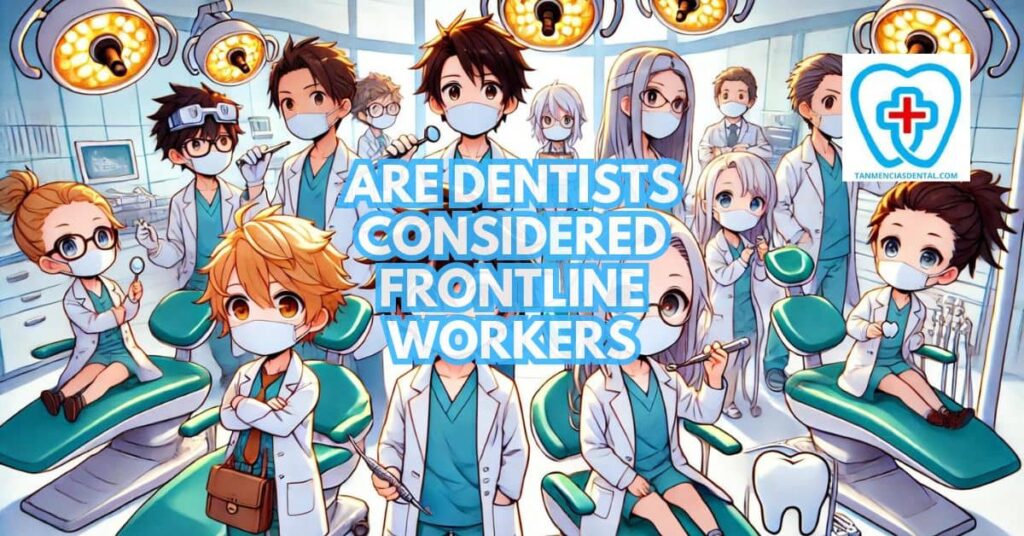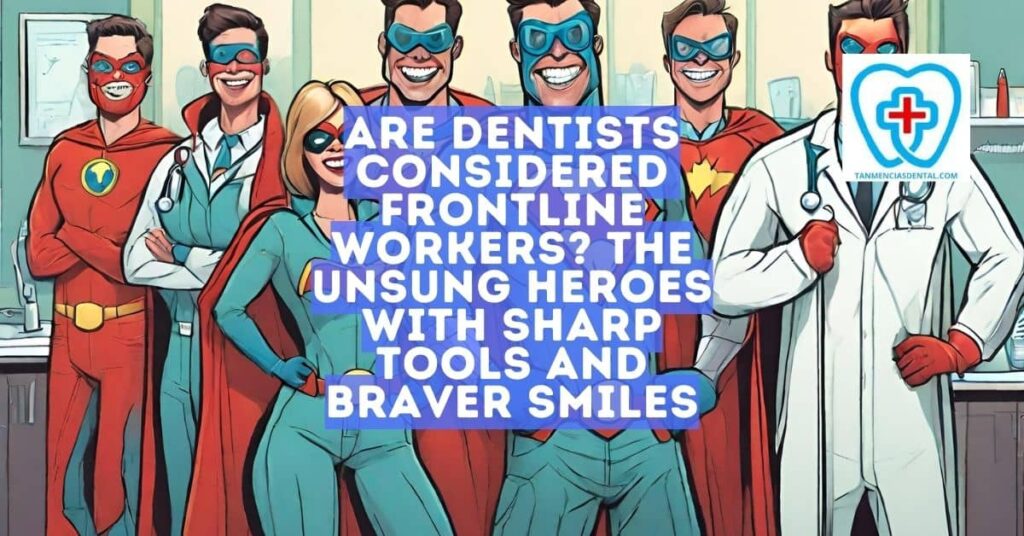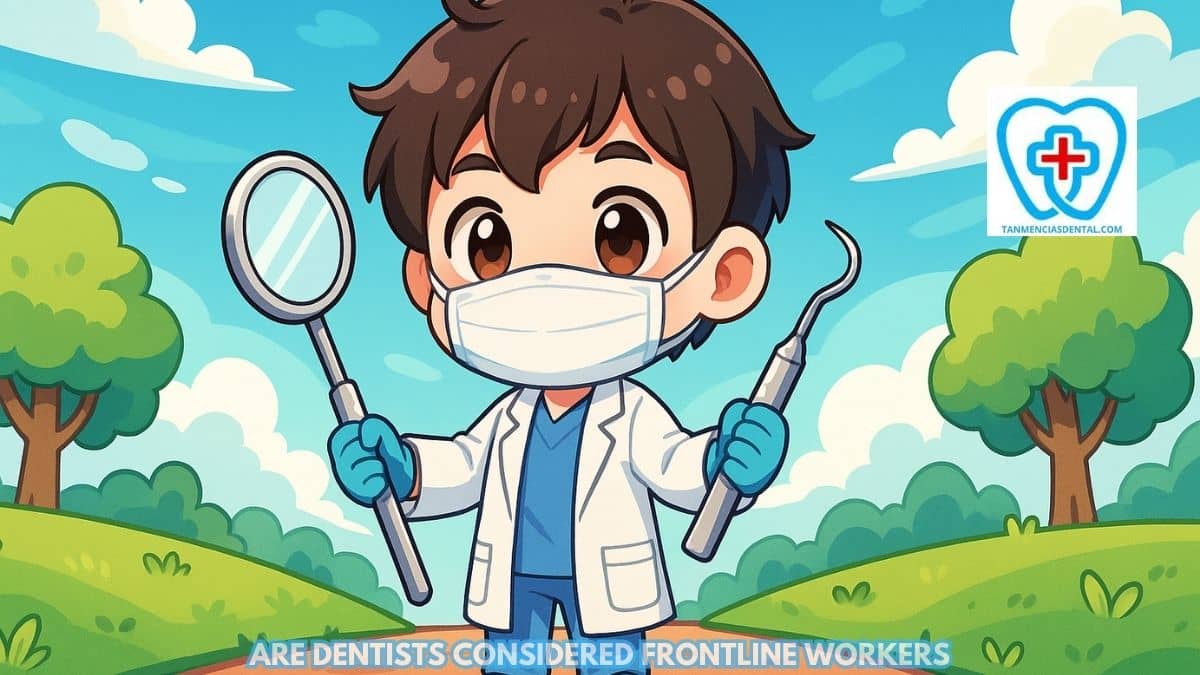Dentists play an important role in public health because they prevent and treat problems that can affect the whole body.
Their work often requires close contact with patients, which raises the question many people ask: Are dentists considered frontline workers?
During health emergencies, dentists continue to provide care that keeps small oral problems from turning into serious medical issues.
Their ability to detect early signs of disease also helps protect overall health in the community.
These responsibilities show why dentists remain an essential part of the healthcare system, especially during times of crisis.
1. What Is a Frontline Worker? Understanding the Definition
Frontline workers are people whose jobs require them to be present in the community during a crisis so that basic needs and safety are maintained.
This group includes doctors, nurses, and other healthcare workers who give direct care to patients.
It also includes first responders such as firefighters and paramedics who answer emergencies and help protect the public.
Many technicians, therapists, and support staff are part of this group because they assist in daily medical tasks that cannot be delayed.
Other workers, such as police officers and essential retail staff, help keep food, safety, and order available to everyone.
These workers face higher risks because they must interact with many people during health emergencies.
Understanding their roles reminds us why they need strong safety rules and resources.
Their steady work helps communities continue to function when daily life becomes difficult.
🦷 How to Choose the Best Toothpaste for Whitening Teeth
2. How Policies Decide When Dentists Are Frontline Workers
Many places use formal rules to decide who counts as a frontline worker, and these rules often guide how the workforce continues to operate during a health crisis.
Some policies decide when dentists can receive vaccination and when they qualify for supplies such as masks and face shields.
In many regions, these rules also determine when dentists can access the COVID-19 vaccine, especially when supplies are limited.
A dental association, like the Philippine Dental Association, in each area may help explain these rules to clinics so they can follow them correctly.
Some governments use the frontline label to decide if dental clinics can stay open when other services must close.
The label can also influence whether dentists receive added support, like hazard pay, because they work closely with patients.
Insurance programs may use the same rules to decide if dentists qualify for extra coverage during an emergency.
These decisions affect how dentists plan their schedules and how they protect their staff and patients.
Because rules vary from place to place, the daily work and safety of dentists can be very different depending on the policies in their community.
🦷 Comparing Popular Methods of Brushing Teeth: Pros and Cons
3. Dentistry During the Pandemic: Elevated Risks and Responsibilities
During the COVID-19 pandemic, dentists faced greater risks because they worked very close to patients and were exposed to saliva that could carry illness.
Many dental tools created tiny droplets in the air that could spread infection, which made strong safety steps necessary.
These steps included better room ventilation, careful cleaning, and more protective gear for all dental staff.
Even with these challenges, dentists continued to give essential care so that small dental problems did not turn into serious cases.
Their work helped keep hospitals from receiving more patients at a time when many healthcare workers were already overwhelmed.
Dentists also spent more time explaining safety rules to patients to help reduce fear about visiting clinics.
This period showed how determined and flexible dental professionals were when faced with new public health risks.
🦷 How to Get In The Habit Of Brushing Your Teeth
4. The Role of Dental Care in Public Health Emergencies
In public health emergencies, the role of dental care becomes even more pronounced due to its impact on preventing infections that can lead to severe health complications.
Dentists help in managing and reducing the load on the healthcare system by treating dental conditions that, if left unattended, could require hospitalization.
Oral health issues can significantly affect an individual’s ability to eat, speak, and maintain personal hygiene, thus affecting their overall quality of life and potentially leading to broader public health concerns.
By continuing to provide care during emergencies, dentists also help maintain the mental well-being of individuals who might otherwise be stressed or anxious about their oral health.
Effective dental care contributes to the resilience of communities, enabling them to better withstand and recover from health crises.
🦷 Why Prepasted Toothbrushes Are a Must-Have for Chronic Illness Management

5. Are Dentists Considered Essential Workers? Clarifying the Status
Dentists are considered essential workers because their occupation plays a major role in keeping people healthy and preventing serious infections.
This status shows that dental care must continue even when other services stop during a public health emergency.
It also means that dental clinics can receive protective equipment and other supplies that help them stay open safely.
Being recognized as essential helps dentists find early signs of health problems that may need medical attention.
This recognition also supports the idea that oral health is closely connected to overall health.
It shows that dentists are expected to serve their communities even when they face difficult conditions.
🦷 The Ultimate Guide to Choosing the Best Toothbrush for Gingivitis
6. Staying Ahead: The Importance of Continuous Training for Dentists
Dentists engage in ongoing education to stay updated with the latest advancements in dental science and technology.
This continuous learning allows them to incorporate new techniques and tools into their practice, ensuring they provide the highest quality care.
Specialized training helps them adapt to emerging health challenges and complex cases.
For instance, with the rise of digital dentistry, many dentists are now trained in using 3D imaging and CAD/CAM systems, which improve diagnostic accuracy and treatment precision.
By committing to lifelong learning, dentists can offer patients the most effective and innovative treatments available, maintaining their trust and satisfaction.
🦷 Can You Use Mouthwash With Braces?
7. The Unsung Heroes of Healthcare: Dentists’ Contribution
Dentists often work behind the scenes, and their contributions to healthcare can sometimes be overlooked in the broader healthcare narrative.
Their work in preventive care, disease management, and oral health education plays a critical role in reducing the need for more invasive and costly medical interventions.
Dentists also play a vital role in identifying signs of systemic diseases during routine oral examinations, often serving as the first line of detection for conditions such as diabetes and heart disease.
The dedication of dentists to their patients’ well-being, through both routine care and emergency interventions, significantly contributes to the health of the community.
As unsung heroes, dentists deserve recognition and appreciation for their integral role in maintaining public health.
🦷 How Often Should You Brush Your Teeth With Baking Soda?
8. Brave Smiles Behind the Masks: The Courage of Dental Professionals
Dental professionals exhibit remarkable courage by continuing to provide care amidst the risks associated with infectious diseases, especially during pandemics.
The close nature of their work, often within the personal space of patients, exemplifies their commitment to health care despite the personal risks involved.
Dental staff, from hygienists to assistants, along with dentists, adopt rigorous infection control practices, showcasing resilience and dedication to patient safety and care.
The protective gear they wear symbolizes their commitment not just to patient health but to the broader goal of preventing disease transmission.
Their bravery in such challenging times reassures patients, offering them a sense of normalcy and security in maintaining their oral health.
🦷 How to Budget for Your Next Dental Checkup and Cleaning Cost
9. Dental Practices: Adapting to Serve as Frontline Facilities
In response to the pandemic, dental practices rapidly adapted to new health and safety protocols to safely continue serving their patients.
Innovations in appointment scheduling, patient screening, and the use of telehealth services minimized risk and maintained essential care.
Enhanced infection control measures, including the use of air purifiers and heightened sanitization practices, became the new standard, ensuring the safety of both patients and staff.
Dental offices also became pioneers in the implementation of social distancing within healthcare facilities, modifying waiting areas and treatment spaces to reduce the risk of virus transmission.
These adaptations underscore the agility of dental practices in responding to public health emergencies and maintaining their role as essential frontline healthcare facilities.
🦷 Why Is Dental Work So Expensive? Comparing Costs Across Different Procedures

10. Challenges Faced by Dentists as Frontline Workers
Dentists, like other frontline workers, face numerous challenges, including a heightened risk of exposure to infectious diseases due to the nature of their work.
The necessity for extensive personal protective equipment (PPE) and the challenge of securing a consistent supply during global shortages have been significant hurdles.
Additionally, the economic impact on dental practices due to reduced patient volumes and increased costs for safety measures has posed financial challenges.
There is also the challenge of managing patient fears and anxieties about visiting dental offices during health crises, which requires effective communication and reassurance strategies.
Overcoming these obstacles requires resilience, adaptability, and support from the broader healthcare community and government.
🦷 Are Dentists Rich? Unveiling the Truth Behind the Smiles and Stethoscopes
11. Public Recognition and Support for Dental Frontline Workers
Public recognition of the vital role that dentists and dental professionals play as frontline workers is crucial for their morale and the acknowledgment of their contributions.
Support from the community and healthcare systems can manifest in various ways, including access to necessary PPE, financial aid for practices struggling with increased operational costs, and policies that recognize the importance of dental health services.
Public appreciation initiatives, such as highlighting their efforts through media and social platforms, can boost morale and emphasize the community’s gratitude.
Ensuring mental health support and resources for dental professionals can also help them manage the stress and challenges of their frontline roles.
This support not only acknowledges their sacrifices and risks but also reinforces the essential nature of their work.
🦷 Endodontic And Periodontal Treatment in Marikina
12. The Future of Dentistry: Integrating Lessons from Being Frontline Workers
The experiences and challenges of the pandemic have paved the way for significant changes in how dental care is delivered and perceived.
Future dentistry is likely to see an increased emphasis on infection control, with practices incorporating more robust measures as standard protocol.
The adoption of telehealth and digital technologies for patient consultations and follow-ups will enhance the efficiency and reach of dental care.
There will also be a greater focus on interdisciplinary collaboration between dental and other healthcare professionals to improve overall patient health outcomes.
These shifts highlight the evolution of dentistry into a more integrated part of the healthcare system, capable of adapting and responding to global health challenges.
🦷 Tan-Mencias Dental Clinic – Premier Dental Clinic in Marikina
👨⚕️ Conclusion
Dentists have proven themselves to be indispensable frontline workers, dedicated to maintaining public health through their expert care and resilience.
Their ability to adapt to unprecedented challenges and continue providing essential services during times of crisis underscores their critical role within the healthcare system.
Recognizing and supporting dentists and dental professionals is vital for ensuring the continued health and well-being of the public.
As we move forward, the lessons learned and the adaptations made during this period will shape the future of dentistry, reinforcing its position as a pivotal part of healthcare.
Acknowledging the value and contributions of dentists as frontline workers is not just a matter of gratitude but a recognition of their essential role in our society.
❔ FAQs
1. Why are dentists considered frontline workers?
Dentists work very close to patients, which places them at higher risk during health emergencies.
They treat problems that can affect the whole body if ignored.
Their care helps keep people healthy and reduces pressure on hospitals.
2. What risks do dentists face during health emergencies?
Dentists are exposed to saliva and other fluids that can spread illness.
Many dental tools create tiny particles in the air that increase the risk of infection.
Because of this, they use strict safety steps to protect themselves and their patients.
3. How do dental clinics stay safe for patients?
Dental clinics use strong infection control rules to lower the chance of disease spread.
They clean tools carefully, improve air flow, and screen patients before visits.
These steps help keep appointments as safe as possible.
4. How do dentists help during public health crises?
Dentists treat urgent problems that could become serious if left alone.
This prevents more people from going to hospitals that may already be crowded.
They also help patients stay calm by giving needed care during stressful times.
5. What can change when dentists are officially labeled as frontline workers?
Some places allow dentists earlier access to vaccines and protective gear during emergencies.
The label can also affect whether their clinics stay open.
These decisions can change how safely and quickly dentists can care for patients.
😁 Self-Promotion
Visit Tan-Mencias Dental Clinic in Parang, Marikina City, where your smile and dental health are our top priorities!
Our friendly team is dedicated to providing you with the highest quality care in a warm and welcoming environment.
For any questions or to schedule your next visit, feel free to call us at 0917-145-1074, leave a message on our Facebook page, or reach out via our website’s contact form.
We’re here to ensure your dental experience is comfortable, personalized, and exactly what you need for a bright, healthy smile.
Let us be a part of your journey to optimal oral health.
Contact us today, and let’s make every smile brighter together!

